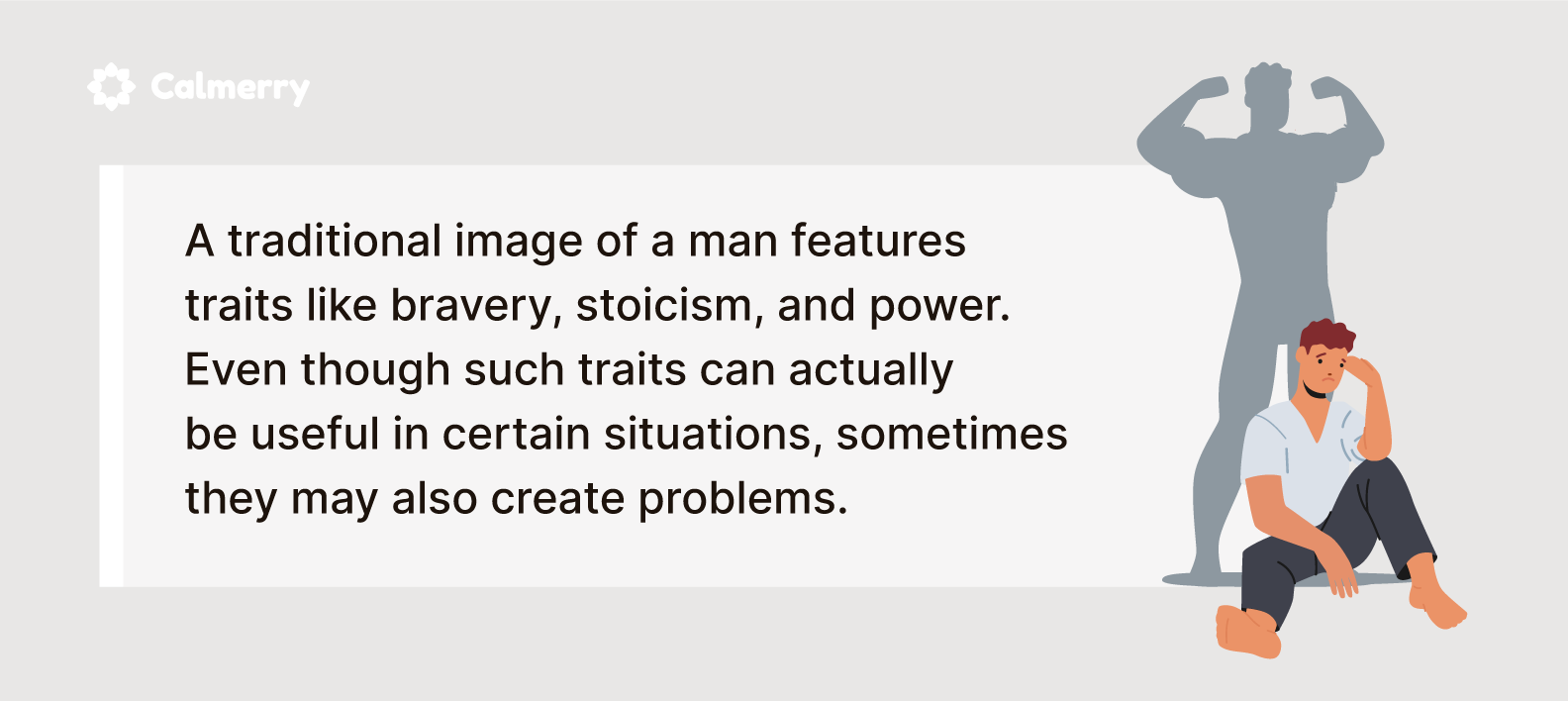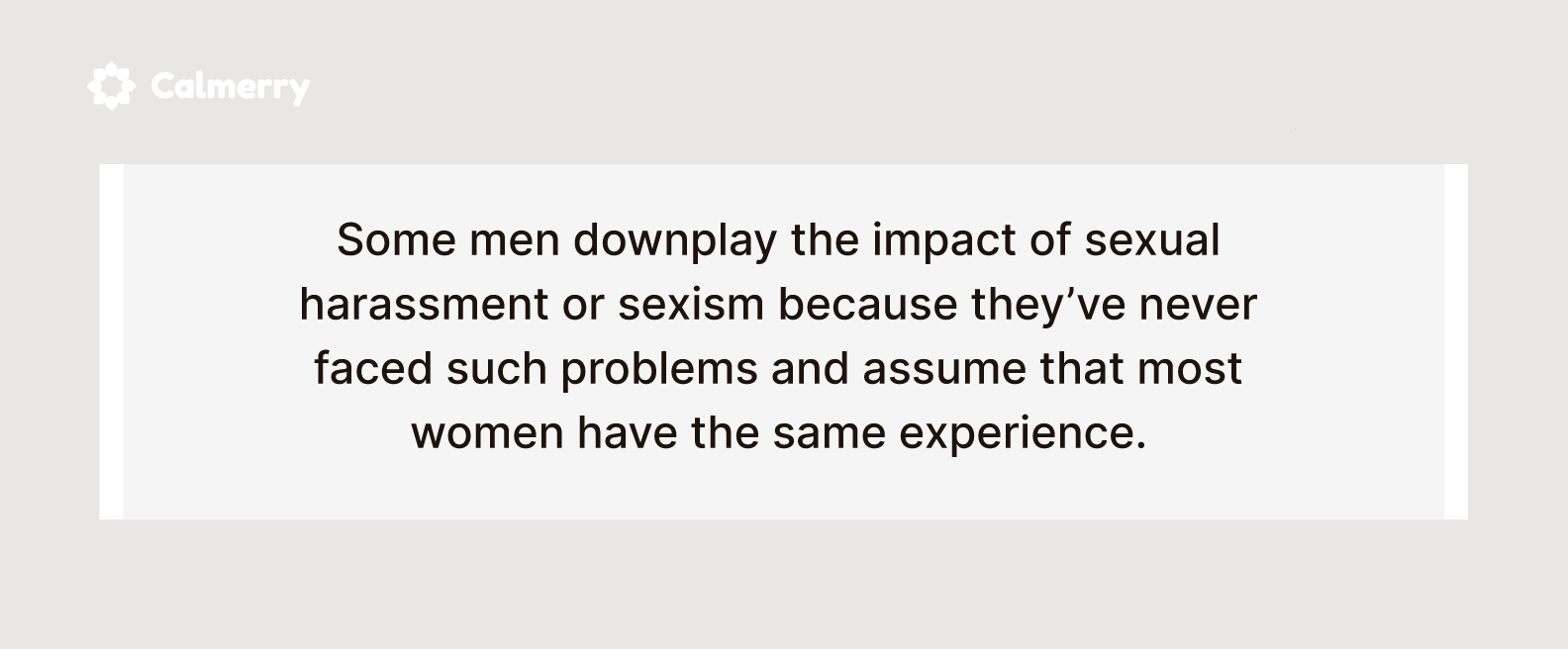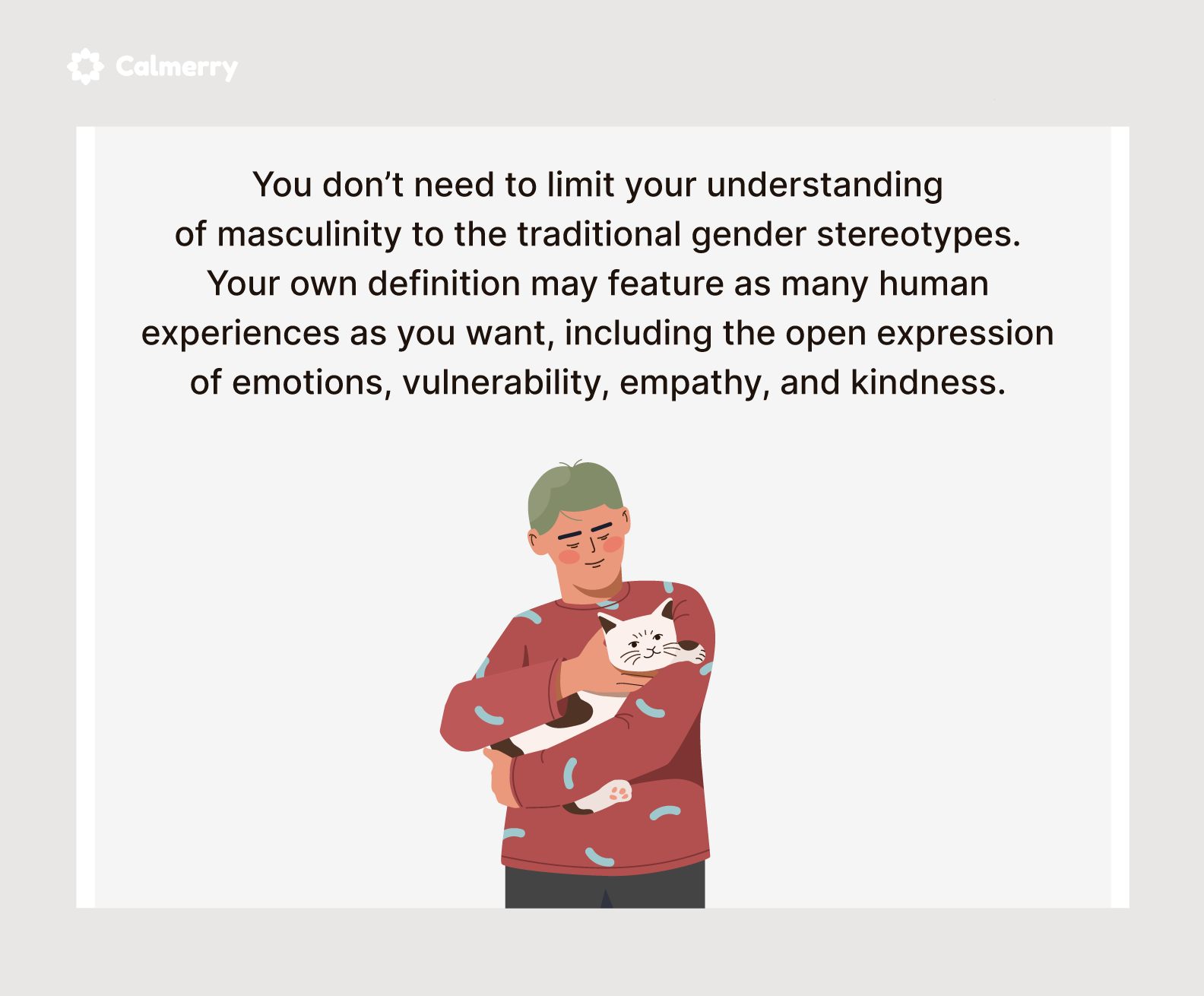Breaking Toxic Masculinity – There’s More Than One Way of Being a Man

In this article
Most of us have heard about toxic masculinity, even though not everyone may recognize toxic male behavior as such.
What is toxicity, and what does it have to do with being a man? Is it men’s behavior that hurts others, or is it just a set of annoying habits?
Well, sometimes, an expression of toxic masculinity by a coworker or family member may just ruin someone’s mood, and sometimes, it may have more serious negative consequences, especially when toxic traits are demonstrated by those who have power over others.
In this article, we’ll consider the connection between toxic masculinity and gender roles, take a look at some common effects of toxic masculinity, and think of whether or not there’s only one way of being a man.
What toxic masculinity is
The term “toxic masculinity” was coined by the men’s mythopoetic self-improvement movement of the 80s and 90s. This movement was heavily influenced by Freud’s psychoanalytic theory, and it described some patterns of male behavior as immature.
The mythopoetic movement lacked a solid scientific background but it came up with some valuable observations. It pointed out that masculinity itself isn’t harmful.
However, societal norms associated with male traits can encourage unhealthy behavior.
The term has quickly become popular, being frequently used when talking about the negative aspects of masculinity. The popularity of this term, however, has created a lot of room for misunderstanding.
So what is masculinity, when does it become harmful, and how does it develop as such?
The flip side of masculinity
The concept of masculinity stems from societal expectations and incorporates many traits: positive, negative, and those that depend on the context and situation.

For instance, unreasonable bravery may lead to risky behaviors, and stoicism may stop men from acknowledging their weaknesses and vulnerabilities.
The fear of appearing vulnerable is one of the main reasons why men have so many excuses to avoid therapy. As a result, men often choose to suppress their emotions, which may eventually find their way out as anger.
The constant urge to demonstrate power can easily turn into domination, which is yet another of the many everyday examples of toxic masculinity.
Generally, “toxic masculinity” is an umbrella term that includes numerous socially regressive traits. [1] Ingram, K. M., Davis, J. P., Espelage, D. L., Hatchel, T., Merrin, G. J., Valido, A., & Torgal, C. (2019). Longitudinal associations between features of toxic masculinity and bystander willingness to intervene in bullying among middle school boys. Journal of School Psychology, 77, 139–151. https://doi.org/10.1016/j.jsp.2019.10.007 These traits can lead to sexism, misogyny, domination, homophobia, bullying, violence, and many other negative consequences.
How toxic masculinity develops
Unhealthy men’s traits are usually a product of societal pressure to conform to rigid, dominant ideals of manhood. It may start with boys being taught from a very young age that they must not show vulnerability and instead must be real men, aggressive and stoic. Over time, this can lead to the suppression of emotions and reinforcement of destructive behaviors.
The irony of the situation is that the exaggerated masculinity that’s considered toxic in modern society has been widely celebrated and glorified in many cultures for many years.
That just might be one of the main reasons why overcoming toxicity often turns out to be so difficult.
Toxic masculinity characteristics
While manliness can be positive, the world has seen unhealthy traits emerge since the beginning of humankind. Here are three examples of negative characteristics associated with harmful male traits.
Bottling up emotions
Boys and men not wanting to cry in front of their male peers is one example of men’s perception of emotions. Guys feel pressure to have a bold exterior and never show their sadness.
If you do, you may fear others see you as weak.
As a result, men tend to bottle up their emotions. Not expressing your feelings now can lead to uncontrolled outbursts later, affecting those around you.
You may also suffer from low self-esteem and reduced confidence because you feel like nobody understands you.
Aggressiveness
Men’s physical strength and competitive mindsets can make them go overboard with their muscles and emotions. Some guys turn to violence instead of peaceful tactics when threatened, displaying a loss of control.
The aggressive trait may derive from the need to feel superior to those around them.
Why is there an association between masculinity and aggressiveness?
A 2021 study discovered men have more physical aggression due to learning and neuroplasticity. [2] Eliot, L. (2021). Brain development and physical aggression. Current Anthropology, 62(S23), S66–S78. https://doi.org/10.1086/711705 The researchers say this cause can also be an interventional tool for correcting toxic behaviors.
Traditional mindsets
The proportion of male breadwinners has decreased, but some men maintain that they should be the highest earners in the family.
Why does this mindset remain? Blame gender roles and stereotypes for this phenomenon.
Men who make less than their female counterparts may feel insecure because of the power dynamics. For instance, a husband making $80,000 a year could perceive their wife as having the upper hand if she makes $100,000 annually.
This disparity shows one of the consequences of unhealthy men’s traits.
The role of gender stereotypes
Unhealthy masculinity stems from power, sexism, and privilege. Power has been historically considered important for men, and it’s believed to be one of the main driving forces behind men’s actions.
Besides, the traditional gender roles have put men into a privileged position, giving them more economic and social power.
As a result, boys who grow up in a society that treats them as a privileged group may take some things for granted.

The connection between unhealthy masculinity and gender norms negatively affects not only women but also men.
For instance, men are often shamed for behavior that doesn’t fit the stereotypical “manly” standards.
A healthy expression of emotions can be interpreted as weakness, while suppression of emotions and unhealthy coping strategies like substance abuse are widely considered normal kinds of behavior by those who conform to masculine stereotypes. [3] Mahalik, J. R., Burns, S. M., & Syzdek, M. (2007). Masculinity and perceived normative health behaviors as predictors of men’s health behaviors. Social Science & Medicine, 64(11), 2201–2209. https://doi.org/10.1016/j.socscimed.2007.02.035
As a result, many men with mental health issues resort to unhealthy coping practices instead of getting the so-needed help. In turn, substance abuse may only worsen symptoms of various mental health disorders, including depression in men.
Men vs. anger
Despite all the negative health effects of anger in men, lashing out every once in a while is rather an ordinary type of male behavior according to traditional gender norms.
In contrast, women usually don’t receive the same kind of forgiving treatment when they openly express their anger.
Research data shows that boys learn to resolve conflicts through aggression as they socialize. [4] Moore, T. M., & Stuart, G. L. (2005). A review of the literature on masculinity and partner Violence. Psychology of Men & Masculinity, 6(1), 46–61. https://doi.org/10.1037/1524-9220.6.1.46 Public displays of aggression are often used by men to prove their masculinity, and other men tend to approve of such behavior.
Perhaps, this is one of the main reasons why men are more likely to commit violent crimes.
The effects of toxic masculinity
Now, let’s talk about the harmful masculinity effects. First of all, it can affect others. A male who demonstrates violent behavior may use domination to assert himself, and he may not recognize this sort of behavior as unhealthy.
That’s why gaslighting and constant criticism are among the most common signs of toxic relationships.
Here are the most common effects of unhealthy manliness :
- Poor mental health care: Men barely request aid because of perceived shame in presenting vulnerabilities that, in most instances, exacerbate further problems like depression, anxiety, or other conditions.
- Violence: Conformity to traditional gender roles may lead to aggression and abuse, such as domestic violence and sexual assault.
- Strained relationships: Difficulty in expression and an unwillingness to be vulnerable may hurt the development of healthy, intimate relationships.
- Self-expression: Men may feel restricted in their interests and behaviors, feeling judged by others for anything that is traditionally perceived as unmasculine.
- Harm to others: It may also correlate with sexism and homophobia, furthering harm and inequity against women and lgbtq + individuals.

The gender norm conflict can have a significant negative impact on men who don’t meet some of the stereotypical gender standards, making them feel like they can only gain acceptance by demonstrating harmful traits.
How to overcome toxic masculinity?
Expectations from friends, romantic partners, or family members can put a lot of pressure on a male who’s trying to find his masculine identity.
Although some individuals, as well as religious and political groups, may emphasize a certain masculinity definition, it’s always better to think of what this concept means to you, and what definition you would like to give it.

Developing your own understanding of masculinity also doesn’t necessarily mean forgetting all of the traditionally masculine traits. Just make sure that these traits resonate with your true self, and don’t put restrictions on you.
Here are some simple tips that might help you overcome toxicity.
Embrace different roles in relationships
Unhealtlhy masculinity in relationships may create not only problems for a partner but also affect the person who demonstrates it.
For example, sex stereotypes don’t allow men to get emotional around anyone, but their wives but also stop men from showing their vulnerability. As a result, they end up expressing frustration and anger.
Besides, established gender norms imply that a male should be a provider. As a result, work can become a crucial part of a man’s identity, and problems at work can have a severe impact on his relationships and self-esteem.
It’s important to realize that expanding men’s roles in relationships can benefit everyone involved. Don’t be afraid to appear vulnerable when talking to your loved one, and don’t hesitate to exchange responsibilities.
For instance, you may spend more time with children. Spending quality time with fathers lowers the risk of developing depression in children and improves their overall life satisfaction. [5] Zimmerman, M. A., Salem, D. A., & Maton, K. I. (1995). Family Structure and Psychosocial Correlates among Urban African-American Adolescent Males. Child Development, 66(6), 1598–1613. https://doi.org/10.1111/j.1467-8624.1995.tb00954.x
Any activity can be manly if you enjoy it
Unhealthy masculinity involves pretty strict “rules” regarding what’s considered manly.
For instance, men who stick to the established gender expectations may have problems with watching a romantic comedy with their partners, while watching an MMA fight would be completely acceptable.
Sticking to the activities approved by gender stereotypes can make you feel insecure. Besides, you may experience the urge to compensate when you feel like your masculinity is threatened, and that can lead to toxic behavior.
To avoid such problems, don’t hesitate to question your understanding of what is or isn’t manly.
The only thing that really matters is whether or not you genuinely enjoy something.
Learn more about other people’s experiences
Sexism, homophobia, and many other expressions of harmful masculinity stem from ignorance. Besides, ignorance fuels stereotypes, so overcoming them can be difficult if you don’t replace them with knowledge.
By actively seeking to understand the experiences of people who are different from you, you can spot your biases and understand their impact.
For example, you may educate yourself about women’s issues by reading books, listening to podcasts, and attending events dedicated to women’s issues. If you’re straight, you may also attend an lgbtq+ event.
Get out of your comfort zone, talk to different people, and don’t be afraid to ask questions to better understand other people’s perspectives.
Identify and examine your biases
Unfortunately, men often don’t notice what’s wrong with them unless other people tell them about it. Let’s say you’re not able to realize some of your biases rooted in harmful men’s traits. However, you can identify them by paying more attention to your reactions to other people’s actions and words.
Think of people of another gender, orientation, or race, and which of their behaviors make you feel irritated or upset.
Why do these things bother you? Do you feel the same when people of your gender/orientation/race do these things?
You can also speak to a therapist online and discuss your observations.
The role of society in breaking toxic masculinity
Society can make a huge contribution to solving this problem of unhealthy men’s traits that have been truly devastating to individuals and communities alike. While the problem is complex, real progress can be made by focusing on a few key areas.
Importance of education and awareness in schools and communities
Perhaps schools could add classes that deconstruct traditional gender norms and foster emotional intelligence among all students. Similarly, community-based programs such as workshops may provide an important forum for discussing healthier manliness forms and their benefits.
Role of media and entertainment in reshaping gender narratives
It would be nice to see more diversity in male characters, showing vulnerability, empathy, and healthy ways of processing emotions. Perhaps, over time, moving away from reinforcing only hyper-masculine stereotypes will eventually shift societal perceptions.
Encouraging conversations among men about vulnerability and identity
Finally, it’s important to let men have free expression. Creating places-possibly support groups or community forums where men can feel comfortable exploring their emotions, identities, and the pressures they face may provide much-needed understanding and self-reflection. It could be that initiatives led by men themselves might be even more powerful in helping men redefine masculinity in a more positive and inclusive way.
Intersectionality of toxic masculinity
Harmful male traits do not operate in isolation from other forms of oppression.
For instance, men of color may face it in a different way, which is the fact of racial discrimination. Men from low socioeconomic backgrounds may face much pressure to keep classic manhood norms at the uppermost.
The intersectional lens allows for a much more complex view of how harmful male traits operate and affect people because of their social identities.This brings out the importance of engaging with multiple forms of oppression to harmful manliness.
Embracing healthy masculinity
Healthy men’s traits mean moving beyond outdated ideas that a man must always be dominant and hide his feelings. Instead, we encourage men to be their true selves, express their emotions freely, and build strong, respectful relationships. Being a male today includes being kind, understanding, and valuing all kinds of healthy connections with others.
There are no positive effects of harmful manliness, but unfortunately, it’s still way too common. Quite often, men resort to unhealthy behavior when they feel like their men’s traits are threatened, and usually, it happens when men fail to demonstrate some stereotypical masculine traits.
To understand how to stop harmful manliness, you should first accept the fact that it’s deeply rooted in outdated gender norms that are still popular among modern men.
Therefore, fighting the toxicity, if you spot it in yourself, may require some bravery and determination.

You should also keep in mind that it might be difficult for a person to recognize their own unhealthy behaviors.
Such a task may require you to work on your self-awareness, so don’t hesitate to ask for professional help. Licensed therapists at Calmerry can help you improve your social skills, figure out the causes of your emotional issues, and suggest effective coping strategies.
How to promote healthier masculinity
Nurturing healthier men’s traits involves challenging harmful stereotypes, encouraging open communication about emotions, and promoting respectful relationships.
It means valuing empathy and vulnerability alongside strength and resilience, leading to more well-rounded individuals and a more positive society.
FAQ
What toxic masculinity really is, and how do we see it in society?
It represents a set of cultural norms that links manliness to violence, aggressiveness, and suppression of emotions. It can look like someone refusing to talk about their feelings, using anger or violence to solve problems, or putting down qualities seen as “feminine” both in themselves and others.
How does toxic masculinity affect men’s mental health?
These norms may cause men to suppress their emotions, which may lead to such conditions as anxiety, stress, depression, and more. Unhealthy manliness may also prevent a man from seeking a therapy option as it might be seen as a sign of weakness.
What are some common stereotypes about how men should act?
Common stereotypes include the expectation that men must be stoic, aggressive, and the primary breadwinners. These stereotypes also often involve avoiding anything perceived as feminine, such as emotional expression or domestic responsibilities.
How can we challenge harmful ideas about masculinity in our own lives?
By being vulnerable, showing emotions, and rejecting the manliness pressure caused by patriarchy, men can resist this unhealthy male trait in their own way. Going for therapy or support groups and reflecting on themselves can also be positive actions.
What are the benefits of positive masculinity?
A healthier version of masculinity means better mental health, stronger relationships, and a fairer society. It allows for a wider range of emotional expression and reduces violence and harmful behaviors associated with traditional masculinity.
Ingram, K. M., Davis, J. P., Espelage, D. L., Hatchel, T., Merrin, G. J., Valido, A., & Torgal, C. (2019). Longitudinal associations between features of toxic masculinity and bystander willingness to intervene in bullying among middle school boys. Journal of School Psychology, 77, 139–151. https://doi.org/10.1016/j.jsp.2019.10.007
Eliot, L. (2021). Brain development and physical aggression. Current Anthropology, 62(S23), S66–S78. https://doi.org/10.1086/711705
Mahalik, J. R., Burns, S. M., & Syzdek, M. (2007). Masculinity and perceived normative health behaviors as predictors of men’s health behaviors. Social Science & Medicine, 64(11), 2201–2209. https://doi.org/10.1016/j.socscimed.2007.02.035
Moore, T. M., & Stuart, G. L. (2005). A review of the literature on masculinity and partner Violence. Psychology of Men & Masculinity, 6(1), 46–61. https://doi.org/10.1037/1524-9220.6.1.46
Zimmerman, M. A., Salem, D. A., & Maton, K. I. (1995). Family Structure and Psychosocial Correlates among Urban African-American Adolescent Males. Child Development, 66(6), 1598–1613. https://doi.org/10.1111/j.1467-8624.1995.tb00954.x
online therapy
live video session



